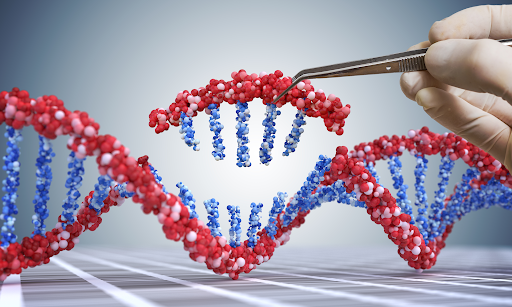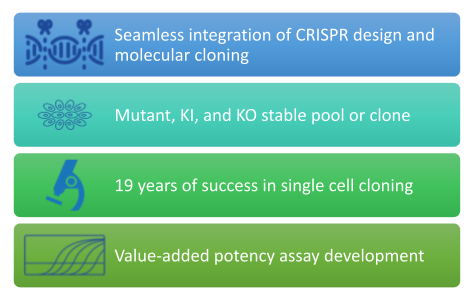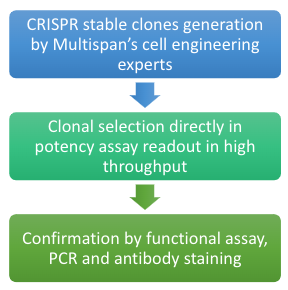Custom CRISPR Cell Line Engineering Services
Harness the power of CRISPR through custom engineered cell line that expresses the desired genomic alterations
Custom CRISPR Cell Line Engineering Services: Tailoring Genomic Alterations to Your Needs
Heterologously expressed targets in stable cell lines are powerful tools for discovering small molecule and antibody drug leads. Assays from these cell lines are robust, reliable and target-specific. Before moving drug candidates into animal models and human trials, translational in vitro assays are much desired intermediate steps. These assays utilize endogenously expressed targets in physiologically relevant cells. However, the challenge is target-specificity. Since related proteins from the same family as the target of interest may signal in the same pathways, the results can be confounding from these native cells. This is where gene-editing is needed.
CRISPR technologies have revolutionized cell engineering by introducing genetic mutations and deletions with precision.
The possibility of generating isogenically CRISPR-modified native stable cell lines along with the wildtype or parental cells are opening up a myriad of possibilities for assay development. Assays from these paired cell lines are properly controlled to pinpoint the target-specific effect. They enhance the biology relevance in cell-based assays without losing data quality. Consequently, they can serve to bridge in vitro and in vivo studies, impacting target discovery, target validation, and drug discovery screening by saving time and cost.
CRISPR technologies have risen as a game-changer in biotech research, especially in the domain of Cell Line Engineering Services. By introducing genetic mutations, insertions and deletions with pinpoint precision, CRISPR has revolutionized cell engineering.

One of the most innovative offerings of Cell Line Engineering Services is the capability to generate isogenically CRISPR-modified native stable cell lines. When paired alongside their wildtype or parental counterparts, these engineered cell lines are transforming assay development. The meticulous control achieved in assays derived from these cell lines allows researchers to attribute effects directly to target-specific modifications. Such advancements underscore the unparalleled value of Cell Line Engineering Services in contemporary biotechnological research.

Embracing CRISPR-modified cell lines through Cell Line Engineering Services ensures not only high data fidelity but also the reflection of authentic biological processes. This alignment between in vitro and in vivo studies proves invaluable in areas like target discovery, validation, drug discovery screening and preclinical studies. With the promise of reduced time, cost, and enhanced precision, Cell Line Engineering Services equipped with CRISPR technologies are poised to be indispensable tools for modern researchers.
In conclusion, as we venture further into the era of genomic customization, the pivotal role of Cell Line Engineering Services, bolstered by CRISPR technologies, cannot be overstated. For those seeking precision, efficiency, and reliability, the future of cell line engineering is here, and it’s tailored to meet diverse genomic needs.
Multispan’s Enhanced MULTISCREENTM CRISPR Gene-Editing Platform: The Pinnacle of Cell Line Engineering Services
Distinguished by its unparalleled innovation, MULTISCREENTM CRISPR gene-editing platform seamlessly merges expansive expertise across assay development, cell engineering, and cloning. Upholding the reputation of MULTISCREENTM cell lines, we prioritize quality above all, ensuring that our CRISPR gene-edited stable cell lines stand out in the market of Cell Line Engineering Services. Our commitment to excellence is reflected in our focus.
Cell Stability
Meticulous single-cell cloning, reinforcing the longevity and reliability of our engineered lines.
Assay Performance
Directly screening in functional assays, we ensure that our cell lines deliver consistent and robust results, streamlining your research process.
Quality Control
Rigorous checks on expression and function post-cell banking, guaranteeing that our cell lines not only meet but exceed industry standards in Cell Line Engineering Services.
Harnessing Advanced Cell Line Engineering Services: A Collaborative Approach with CRISPR Expertise
Initiating our robust Cell Line Engineering Services, we join forces with leading CRISPR nuclease technology experts, ensuring the premium quality of gRNA design and optimization. Simultaneously, we define the disease-biology relevant cell line and the appropriate signaling pathway or phenotype for the initial assay. Parental cell lines may originate from specific tumors such as lung, pancreas, liver, kidney, ovary, breast, nerve, and bone. Our assays, tailored for precision, can be founded on signaling 2nd messenger, reporter, phenotype, or binding with fluorescence, TR-FRET, and chemiluminescence readouts. For G-protein Coupled Receptors (GPCRs), our Cell Line Engineering Services and cell banking services, have given rise to a plethora of cell-based assays, including but not limited to Ca++, cAMP, β-arrestin, pGRK2, IP-1, pERK, pNFκB, cell proliferation, internalization and luciferase reporter.
Following the transfection of CRISPR-gRNA, a stable pool of cells is typically ready for testing within a 2-week frame. However, the inherent heterogeneity of these cells renders them unsuitable for long-term drug discovery projects where data consistency over prolonged periods is paramount. Addressing this challenge, the Multispan team, with over a century of collective experience in cell sciences and signaling, employs our specialized Cell Line Engineering Services to produce cell lines renowned for their stability, enduring for decades when appropriately preserved.

How do we pick the CRISPR-edited single cell clones?
By functional assay directly! Based on functional efficacy, heterozygous or homozygous stable cell lines can be detected and selected at the same time. The change of expression of the targets in the engineered clones will be further validated by flow-cytometry, western blotting, or RT-PCR. We have a 100% success rate for the generation of quality clonal stable cell lines for >500 targets. Furthermore, these highly characterized stable cell lines can be seamlessly integrated into our scaleup cell banking and compound screening services, which makes fast compound screening data turnaround possible.
Interested in assay-ready CRISPR-edited stable cell lines for high throughput screening to propel drug discovery? Multispan can help!
FAQs
A CRISPR cas9 kit equips biotechnology and medical researchers with the necessary reagents and tools to perform Cas9 gene modification for a variety of purposes. By packaging essential components together, these kits simplify the process and make it more efficient. Whether researchers desire to study specific gene functions or develop new treatments for genetic illnesses, CRISPR kits enable cell engineering through genetic editing.
Cell engineering is the process of modifying cells to alter or adjust their functions in specific ways. The outcome possesses a wide range of therapeutic and research applications in various scientific fields. In drug discovery, cell engineering can be used to create more effective models of diseases for researchers to develop and test potential drug candidates.
CRISPR screens allow researchers to study the function of genes with great efficiency, scale, and throughput. By enabling precise gene modification in cells, researchers can determine how certain mutations affect protein target function and cell behavior. It in turn helps uncover the roles of specific genes in various biological processes and diseases.
The duration of a CRISPR screen can vary greatly, anywhere from a month to a year. This depends on the complexity and amount of genes being researched. For example, target genes with less apparent phenotypic effects, or those involved in particularly complex pathways, could require longer screening times to validate their roles.
Yes, they are often used in CRISPR systems for component delivery into targeted cells. The type of CRISPR plasmid used depends on the desired purpose of the plasmid. This includes the delivery of Cas9, guide RNA (gRNA), or multiplexed gRNAs.
